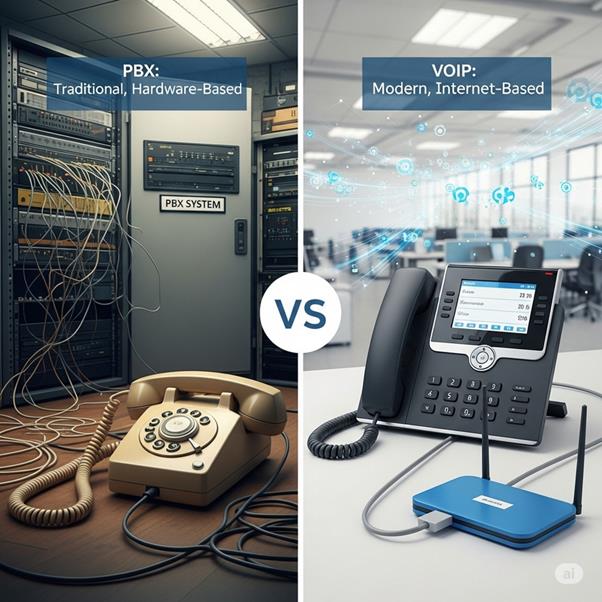PBX vs VoIP: Which Business Phone System Should You Choose?
As the business world continues to evolve, the tools that support daily operations must evolve too--especially communication systems. One of the most common questions companies face today is: PBX vs VoIP--what's the difference, and which is better for your business?
Both systems serve the same core purpose--handling your phone calls--but how they do it, and the benefits they offer, are very different. In this blog, we'll explore what PBX and VoIP are, how they compare, and how to choose the right system based on your unique business needs.
What Is a PBX System?
PBX (Private Branch Exchange) is a traditional business telephone system that uses on-premise hardware to route internal and external calls. These systems are often connected to ISDN lines or analogue telephone lines and are physically installed in your office or data centre.
- Internal call routing and extension management
- Voicemail and call transfer capabilities
- On-site control over telephony systems
- Works with desk phones and traditional handsets
Many large enterprises still use PBX systems, especially if they've invested in physical infrastructure over time. They provide stable performance and consistent call quality especially useful in environments with limited internet connectivity.
What Is VoIP?
VoIP (Voice over Internet Protocol) is a modern phone system that uses the internet to make and receive voice calls. Instead of using physical telephone lines, VoIP converts your voice into digital packets and sends them over a broadband connection.
- Cloud-hosted or internet-based infrastructure
- Easily scalable for growing businesses
- Supports mobile devices, desktops, and VoIP-enabled phones
- Features like call forwarding, auto-attendants, voicemail-to-email, and more
VoIP is a popular choice for businesses looking for flexibility and remote-work readiness. It offers powerful unified communication tools and is cost-effective, especially for small and mid-sized businesses.
PBX vs VoIP: Side-by-Side Comparison
| Feature | PBX System | VoIP System |
|---|---|---|
| Infrastructure | On-premise hardware | Cloud or internet-based |
| Initial Cost | Higher (hardware investment) | Lower (subscription-based) |
| Scalability | Manual upgrades or hardware changes | Instant scalability via the cloud |
| Remote Access | Limited | Full support for mobile/remote users |
| Maintenance | In-house IT team required | Managed by VoIP provider |
| Features | Basic to moderate | Advanced UC features |
Which System Is Right for Your Business?
The answer to the PBX vs VoIP
question depends largely on your current infrastructure, business goals, and team structure.
Choose PBX if:
- You already have a PBX system and want to maintain on-site control
- Your office has poor internet reliability
- Your IT team is equipped to manage hardware
Choose VoIP if:
- You need a flexible, scalable solution
- Your team works remotely or in hybrid setups
- You want to reduce hardware and maintenance costs
- You need access to modern communication tools
The ISDN Switch-Off: Why VoIP Is the Future
In the UK, BT is phasing out ISDN and PSTN lines by the end of 2025. That means businesses using traditional PBX systems connected via ISDN must transition to IP-based solutions like VoIP.
What This Means for PBX Users:
- Convert your PBX to use SIP trunking
- Or migrate fully to a cloud-based VoIP solution
At
Splicecom,
we're helping businesses make this transition smoothly--whether it's a complete cloud migration or a hybrid approach.
Why Choose Splicecom for Your Voice Solution?
- UK-developed technology that meets local compliance standards
- On-premise, cloud, or hybrid solutions tailored to your business
- Expert consultation and support from our network of UK partners
- Future-proof systems aligned with the ISDN switch-off
- Seamless integration with Microsoft Teams and CRM tools
Final Thoughts:
PBX vs VoIP
The decision between PBX vs VoIP is about more than technology--it's about aligning your communication system with your business model and future growth.
If your company is ready to embrace flexibility, reduce costs, and enable modern work environments, VoIP may be the better choice. However, if you need complete control and already have infrastructure in place, PBX may still serve you well--especially when combined with cloud features in a hybrid model.
At
Splicecom,
we provide end-to-end solutions that help you move forward with confidence--no matter where you are on your communications journey.




